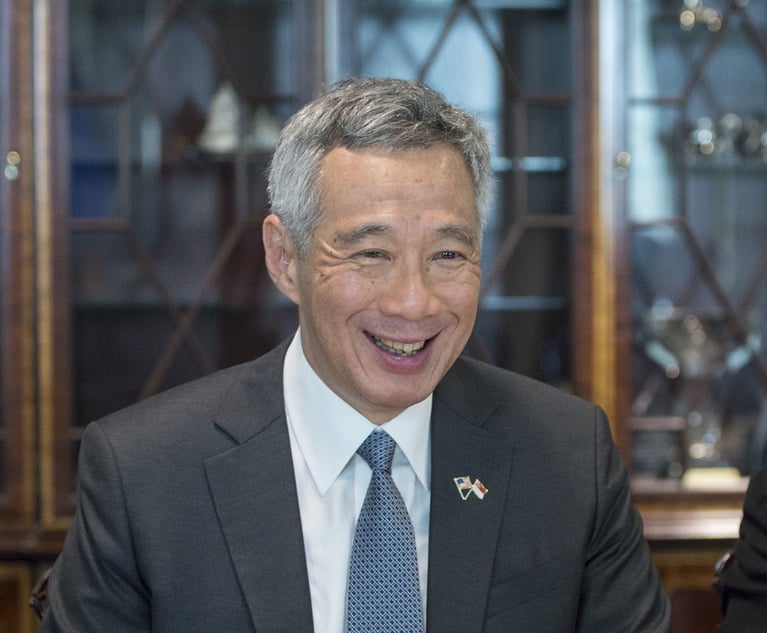Hong Kong's top prosecutor calls for committee to regulate SFC
The Securities and Futures Commission (SFC) of Hong Kong should be subject to internal checks and monitoring by a community-based committee, the city's top prosecutor said yesterday. Director of public prosecutions Kevin Zervos, who earlier called for the investigatory body to be stripped of its powers to prosecute, said that at the very least the SFC should be appropriately regulated, to ensure proper use of its powers and to prevent any internal misappropriation.
August 29, 2013 at 11:55 PM
4 minute read
The Securities and Futures Commission (SFC) of Hong Kong should be subject to internal checks and monitoring by a community-based committee, the city's top prosecutor said yesterday.
Director of public prosecutions Kevin Zervos, who earlier called for the investigatory body to be stripped of its powers to prosecute, said that at the very least the SFC should be appropriately regulated, to ensure proper use of its powers and to prevent any internal misappropriation.
"It is natural when you have a body that has an investigatory function that they will be very committed to the case they are involved in," he told local media at the offices of the Department of Justice (DoJ).
"But I find some difficulty when you give major prosecution decision-making powers to a body that has extensive coercive powers.
"I think they should have the same sorts of mechanisms available to appropriately regulate their powers, and conduct and deal with any possible breaches. So that requires appropriate internal regulation… and an appropriate outside body, not that comes from the industry but that is community-based.
"I think having a community-based, outside committee [would provide] a very important check to make sure powers are being used fully and properly."
Zervos, who will step down from his role in September, was expanding on comments he made in the city's Prosecutions 2012 report, released earlier this month.
In the report, he wrote that it was a matter of some concern that a law enforcement agency had responsibility for prosecution, and that this had caused tension between the prosecutions division and the SFC. He also said that the SFC lacked appropriate internal regulation and policing, and it would be preferable if it was stripped of its prosecutorial responsibility – which would be better placed with an independent prosecution service.
"If there is criminal wrong-doing it should be dealt with by the courts," he added at the media briefing.
"Investigators investigate, prosecutors prosecute… We as a prosecutions service provide a very important check to law enforcement…We are able to look at things more objectively."
Asked if he thought this could reduce the number of investigations and criminal convictions of financial institutions in Hong Kong, Zervos said he didn't believe it would, and if anything, the numbers could increase.
He added that the market would also benefit from the SFC working in tandem with other specialist law enforcement agencies depending on the scope of criminal activity being investigated.
The SFC is an independent statutory body established in 1989 to regulate the securities and futures markets in Hong Kong in accordance with the Securities and Futures Ordinance (SFO).
It monitors a mix of brokers, investment advisers, fund managers and listed companies, as well as the Hong Kong stock exchange and its investors.
The current CEO is Ashley Alder, the former head of Asia for Herbert Smith Freehills, who left private practice to work for the SFC in October 2011.
Both Alder and the SFC were unavailable for comment.
Finally, Zervos stressed the importance of class actions as a way of allowing individual rights to be properly represented in the courts.
In January this year, a working group met to discuss the possibility of introducing class actions in Hong Kong, to create further options for multi-party disputes in the city.
"As a lawyer, I believe in them," Zervos said. "In appropriate types of cases they are necessary and effective. I think [they] should be encouraged."
Related: Hong Kong's DPP defends unqualified court prosecutors.
This content has been archived. It is available through our partners, LexisNexis® and Bloomberg Law.
To view this content, please continue to their sites.
Not a Lexis Subscriber?
Subscribe Now
Not a Bloomberg Law Subscriber?
Subscribe Now
NOT FOR REPRINT
© 2025 ALM Global, LLC, All Rights Reserved. Request academic re-use from www.copyright.com. All other uses, submit a request to [email protected]. For more information visit Asset & Logo Licensing.
You Might Like
View All
Singapore Leaders Stress the Importance of the Rule of Law Amid Geopolitical Tensions

Can Law Firms Avoid Landing on the 'Enemy' List During the Trump Administration?
5 minute read

Letter From Asia: Will Big Law Ever Bother to Understand Asia Again?
Trending Stories
Who Got The Work
J. Brugh Lower of Gibbons has entered an appearance for industrial equipment supplier Devco Corporation in a pending trademark infringement lawsuit. The suit, accusing the defendant of selling knock-off Graco products, was filed Dec. 18 in New Jersey District Court by Rivkin Radler on behalf of Graco Inc. and Graco Minnesota. The case, assigned to U.S. District Judge Zahid N. Quraishi, is 3:24-cv-11294, Graco Inc. et al v. Devco Corporation.
Who Got The Work
Rebecca Maller-Stein and Kent A. Yalowitz of Arnold & Porter Kaye Scholer have entered their appearances for Hanaco Venture Capital and its executives, Lior Prosor and David Frankel, in a pending securities lawsuit. The action, filed on Dec. 24 in New York Southern District Court by Zell, Aron & Co. on behalf of Goldeneye Advisors, accuses the defendants of negligently and fraudulently managing the plaintiff's $1 million investment. The case, assigned to U.S. District Judge Vernon S. Broderick, is 1:24-cv-09918, Goldeneye Advisors, LLC v. Hanaco Venture Capital, Ltd. et al.
Who Got The Work
Attorneys from A&O Shearman has stepped in as defense counsel for Toronto-Dominion Bank and other defendants in a pending securities class action. The suit, filed Dec. 11 in New York Southern District Court by Bleichmar Fonti & Auld, accuses the defendants of concealing the bank's 'pervasive' deficiencies in regards to its compliance with the Bank Secrecy Act and the quality of its anti-money laundering controls. The case, assigned to U.S. District Judge Arun Subramanian, is 1:24-cv-09445, Gonzalez v. The Toronto-Dominion Bank et al.
Who Got The Work
Crown Castle International, a Pennsylvania company providing shared communications infrastructure, has turned to Luke D. Wolf of Gordon Rees Scully Mansukhani to fend off a pending breach-of-contract lawsuit. The court action, filed Nov. 25 in Michigan Eastern District Court by Hooper Hathaway PC on behalf of The Town Residences LLC, accuses Crown Castle of failing to transfer approximately $30,000 in utility payments from T-Mobile in breach of a roof-top lease and assignment agreement. The case, assigned to U.S. District Judge Susan K. Declercq, is 2:24-cv-13131, The Town Residences LLC v. T-Mobile US, Inc. et al.
Who Got The Work
Wilfred P. Coronato and Daniel M. Schwartz of McCarter & English have stepped in as defense counsel to Electrolux Home Products Inc. in a pending product liability lawsuit. The court action, filed Nov. 26 in New York Eastern District Court by Poulos Lopiccolo PC and Nagel Rice LLP on behalf of David Stern, alleges that the defendant's refrigerators’ drawers and shelving repeatedly break and fall apart within months after purchase. The case, assigned to U.S. District Judge Joan M. Azrack, is 2:24-cv-08204, Stern v. Electrolux Home Products, Inc.
Featured Firms
Law Offices of Gary Martin Hays & Associates, P.C.
(470) 294-1674
Law Offices of Mark E. Salomone
(857) 444-6468
Smith & Hassler
(713) 739-1250








